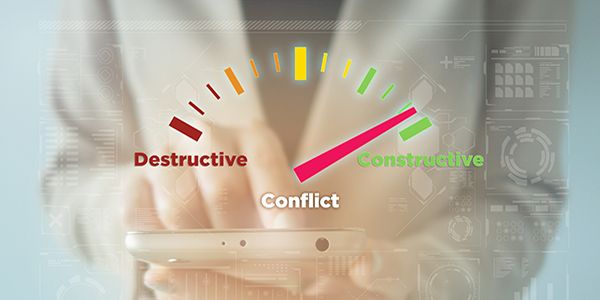
Constructive Conflict Is Better Than False Agreement
Over a decade ago, I was in a workshop with a range of different stakeholders.
Everything seemed to be going well, and people seemed to be agreeing and we were even running ahead of the meeting schedule. Around halfway through the meeting a particular issue was being discussed, a conclusion was going to be drawn and a stakeholder interjected strongly and firmly with two powerful words. They simply said:
“I disagree”
I remember being taken aback by the bluntness. I live in the UK and our communication style is somewhat indirect most of the time. It’s far more normal to say “Hmmm, interesting idea, or what about…?” which is code for “That’s a crazy idea”. Or often the temptation might be to revert to the ultimate British stereotype and apologize “Sorry to be a pain here, but I’m not sure I entirely agree”. I’m sure British culture is not the only one that has such indirect nuance.
The reason I remember this meeting so vividly, even more than a decade ago is that those two words initially made people visibly uncomfortable. Someone was breaking the consensus; they were “creating conflict”. Yet that wasn’t the intention, and of course they didn’t just say that, the stakeholder went on to explain the source of their disagreement, and what they proposed instead. Thirty seconds later (once the stakeholder had explained themselves) any feeling of discomfort gently dispersed. What’s more, other attendees of the meeting started to question things, interject and show disagreement. One stakeholder questioning a decision had the apparent result in creating perceived permission for others to do so. And you know what? I am convinced that the output of that meeting was better as a result.
Don’t Let Conflict Fester
Many of us have been taught to consider conflict as bad and consensus as good. I suppose that is true in an ideal case, but if you’re working on any kind of large scale change how realistic is it that every stakeholder is really going to be ‘on the same page’ and in total agreement? If a government implements a new type of tax and requires businesses to submit more information, there’s unlikely to be a standing ovation from business owners. Yet that doesn’t mean that their input isn’t valuable—I would go as far as saying it’s essential!
Our fixation with consensus can lead to a situation where we achieve illusory agreement, a veneer of satisfaction. Dissenting voices get marginalized, as they’ll never agree (so why spend too much time asking them?). We carefully facilitate meetings so that there aren’t big disruptive arguments, as we’re desperate to hit all of the aggressive (sorry ‘ambitious’) project deadlines. Yet this dangerous glossy veneer is very quickly broken when people start to interact with the product or service that we deliver. All we’ve done is defer the conflict to an even less convenient time, often a time when there’s so much political capital riding on the ‘solution’ that’s been designed that there’s no appetite to change it.
Cultivating Constructive Disagreement
As business analysts, we can help avoid these situations. We have the opportunity to create space for constructive and respectful conflict, and we should certainly avoid us or others sidelining people just because they have contradictory views. In our analysis activities we should encourage constructive and respectful disagreement.
Taking an example, when setting up a workshop we have the perfect opportunity for creating the opportunity for a robust and respectful discussion. We can lay down an appropriate set of ground rules that allow for differences of opinions to surface. I’ve found myself opening workshops saying things such as:
“This is a controversial topic, and there are bound to be some differences of opinion. That’s to be expected. With that in mind please do speak up at any time and add your view, but please do be prepared to elaborate on it. Keep in mind I’ll be facilitating fiercely but fairly—and there might be times when I need to ‘park’ your item for later discussion. It absolutely won’t be lost, we will come back to it, but please don’t be offended if I need to do that.”
When we facilitate, we can actively prompt, asking questions such as:
“We seem to have complete agreement here; are there any contradictory thoughts. What have we missed?”
Ensuring that stakeholders have the ‘air time’, and ensuring that the most bombastic attendees don’t steal the limelight is crucial. Using a range of tools and techniques in the workshop to consider not only what we want but also what could go wrong can be useful too. Even just asking a question such as “That seemed too simple, might we have missed something?” can help.
Most of all, cultural nuances aside, we shouldn’t be afraid of the concise clarity of an expression such as “I disagree”. When someone says it they provide us with a gift, an opportunity to better understand them.